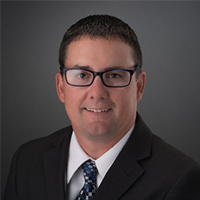 Earling Estate Lawyers, Iowa
Earling Estate Lawyers, Iowa
Sponsored Lawyers
1-10 of 13 matches
Accident & Injury, Employment, Estate, Real Estate, Civil & Human Rights
Jamie L. Cox is a partner at Willson & Pechacek, PLC, in Council Bluffs, Iowa. Mr. Cox’s general litigation practice focuses on personal injury law, employment law, estate and trust litigation, business law, and civil rights law. He represents clients in Iowa and Nebraska. A native of Wapello, Iowa, Mr. Cox graduated with honors and distinction from the University of Iowa, where he earned bachelor’s degrees in history and sociology in 1998. He later obtained his law degree from The University of Iowa College of Law in 2001. Licensed to practice in the state courts of Iowa and Nebraska, Mr. Cox is also admitted to the U.S. District Courts for the Northern and Southern Districts of Iowa, the U.S. District Court for the District of Nebraska, the U.S. Tax Court, the Iowa Supreme Court, the Nebraska Supreme Court and the Supreme Court of the United States. He joined Willson & Pechacek, PLC, in 2001 and became a partner in 2006. Mr. Cox belongs to a number of professional organizations, including the he American Bar Association, the Iowa State Bar Association, the Nebraska State Bar Association, the Pottawattamie County Bar Association, and the Iowa Defense Counsel Association. He is a member of the Iowa State Bar Association section councils for Litigation and Employment Law, and also belongs to the dispute resolution, labor and employment law and state and local governing sections of the American Bar Association. In addition to his professional commitments, Mr. Cox enjoys participating in his local community. He serves as member of the Board of Directors of the Council Bluffs Chamber of Commerce, as a soccer coach for the Council Bluffs Soccer Club, and a Boy Scouts adult leader.
(more)




